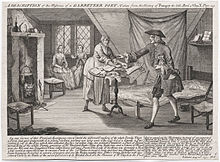I recently read ‘Down and Out in 18th Century London’ by Tim Hitchcock and although I was sometimes lurched about by the anecdotal style, I enjoyed it and was pointed to a number of other interesting works.
One of these was ‘Pompey the Little’ by Francis Coventry. How could I resist a book centring on a Bologna lapdog?
Coventry makes his allegiances clear, dedicating the book to Henry Fielding. Although he doesn’t have the same delicious and all pervading irony as Fielding, nor does he have Fielding’s ability with an understatement, a similar spirit runs through this book.
Pompey is a Bologna lapdog who finds his way from owner to owner, sometimes by luck and sometimes by his own actions and as such is not dissimilar to Fanny Hill (who gets a walk on part). Owners include people in the high-life with such wonderful names as Lady Harriden and the Lord Marmozet; children who play a little too rough, a Cambridge fellow, a few shopkeepers, a destitute poet and a blind beggar.
The pattern of owner, satyrical gibes, new owner should have become boring but Coventry nails the different characters and situations so well that each change is a delight. I pretty much galloped through the book and enjoyed it throughout.
Naturally my favourite owner was the impecunious scribbler Mr Rhymer. The chapters featuring him are the perfect representation of a Grub Street life I have yet read in print and I reckon it should be as well known as Hogarth’s famous image of the distressed poet.
‘In one corner of these poetical apartments stood a flock-bed and underneath it, a green jordan presented itself to the eye, which had collected the nocturnal urine of the whole family...Three rotten chairs and a half seemed to stand like traps in various parts of the room, threatening downfalls to weary strangers; and one solitary table in the middle of this aerial garrett, served to hold the different treasures of the whole family.’ Needless to say, the treasures are meagre indeed.
Mr Rhymer’s wife is not happy to see that he has had a useless lapdog foisted on him by a Lord as a ‘gift’ and berates him for selling his chandlers’ business to take up writing. He argues that she should be pleased to have married a man so above the petty mechanics of life. We get the feeling this is an argument the two have had a number of times. After a dinner of weak broth, Mr Rhymer untroubled by ‘any of fumes of indigestion’ works on an ‘epic poem which was then on the anvil,’ before going out to a meeting of other writers, accompanied by Pompey.
The meeting of writers is torn apart by argument and Mr Rhymer walks home ‘in a pensive solitary mood, wrapped up in contemplation on the stars of heaven, and perhaps forgetting for a few moments that he had three-pence half-penny in his pocket.’ I find this a wonderfully poetic moment and typical of little character moments in the book.
Pompey’s fortunes change again when a couple of hooligans spy Mr Rhymer, ‘smoked him for a queer fish’ and duff him up. Pompey is quite pleased with this reversal as he was afraid he may ‘have fallen sacrifice to hunger, and been served up on Mr Rhymer’s poetical table’.
‘Pompey the Little’ is obviously a first novel and doesn’t reach the heights of a ‘Tom Jones’ or a ‘Tristram Shandy’ but there is much good about it. I think the success of the book lies in a statement made right at the beginning in the dedication to Henry Fielding. ‘The characters of a novel principally determine its merit’. I believe this is the case today and was the case then, and on those merits ‘Pompey the Little’ succeeds admirably.





No comments:
Post a Comment